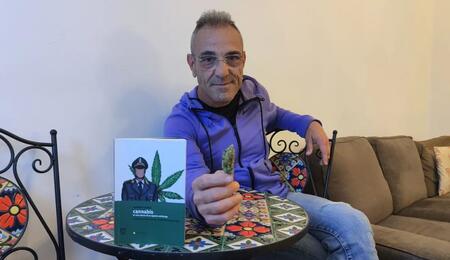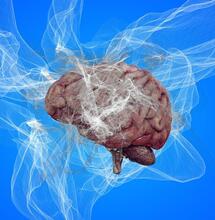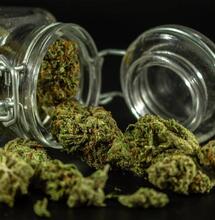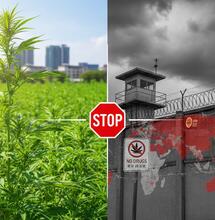Former Officer Now Pro-Cannabis: “It Saved My Life”

Alfredo Ossino used to work in the anti-drug police department, until he got an illness that almost had him paralyzed. Doctors prescribed him opiates for years to help with the pain, but those drugs caused many unwanted side effects. Eventually, Ossino turned to cannabis, and as he says, the therapeutic plant is what saved him from living hell.
Alfredo Ossino has a serious medical condition for which he needs to use 90 grams of cannabis each month, as prescribed by a specialist. However, the delivery of his medical cannabis is always late, so he often needs to rely on other sources to ensure he has enough medicine for the time being.
But that’s only one of many problems the former anti-drug police officer has faced in his native Italy. The days of doing service with the police are long past him, and he is now a cannabis activist, trying to make things better for other medical cannabis patients like himself, who struggle to get and freely use the only drug that seems to work.
Ossino spent most of his career in the Guardia di Finanza, until he began suffering from a serious condition on his spine, which at one point made him unable to make the most basic movements with his body. An ordeal that lasted for years until he discovered the therapeutic benefits of cannabis.
“I have been reborn, our country must understand that it can save many lives like mine, I had reached the end of the line,” says Mr. Ossino, whose book Cannabis, the True Story of an Anti-Drug Agent is due to go out in the month of May.
From Hell to Rebirth with Medicinal Cannabis
Mr. Ossino, 59, was born in Genoa but lives in Catania, Italy. While he used to be an officer working on cases involving drugs, nowadays he is an activist and currently travels around the country to promote his revealing book. In it, he recounts in great detail the violations of the law perpetrated by the Italian state toward medical cannabis patients in Italy.
“I had become a zombie, I could not move, I could not take the stairs, carry weights or even walk ten meters without being bent over with pain. I didn’t leave the house anymore because of the excruciating pain I felt,” Ossino explained in an interview with Soft Secrets Italia.
“Today I am reborn, I walk 30 kilometers a day, I jump rope, I don’t stop for a moment. Cannabis has allowed me to return to life but the state continues to look past the endless testimonies of doctors and patients attesting to its therapeutic efficacy,” he said. “The rights of patients must be defended, and the state’s discrimination toward the cannabis and hemp sector, which is affecting the Italian economy, must be denounced.”
Before his illness, Alfredo was completely dedicated to his work in the Guardia di Finanza. “It has always been a desire of mine since I was a child,” Alfredo said. “I joined the Fiamme Gialle [the sport section of the Italian police force] at 17 with my parents’ permission. At the age of 18 in the Financia Officer’s Training Unit in Rovigo and then, depending on the needs of service, in different operational departments, including the Anti Drug Operational Group in Rome based at the Central Tax Police Unit in Rome and Naples where we fought drugs, weapons, cigarette smuggling and whatnot. An extreme and very dangerous reality that I will never forget.”
Because of the operational service, Ossino had a very demanding and taxing lifestyle that would later cause the disease. “We slept in the street, in the car. Living conditions were sometimes very bad. There was no private life. People ignore it, but there are more than 60 suicides a year among Guardia di Finanza, State Police, Carabinieri, Forestry and Penitentiary Police, and also in the Italian Army,” he said.
“Sixty suicides a year means more than four suicides a month, cleverly concealed from the public. In my case, an acquired cervical stenosis took over, causing a marked negative functional incidence to the cervical tract, basically hernias leaking out of their seat, compressing the bone marrow and nerve roots, causing very severe pain and numbness in the limbs. At first, in 2001, it didn’t seem like a serious condition, then, day after day, it destroyed my life,” Ossino said.
In 2006, the Military Medical Commission placed Mr. Ossino on leave for three months for service-dependent conditions, but by then it was too late. His medical condition continued to worsen. “After 18 months of leave, I was discharged because I even had difficulty safely handling my service weapon,” Ossino said.
Five years later, in 2012, he called the Military Medical Commission for another examination as he was gradually starting to lose motor functions. “I could not walk, I was ostracized, I fell into depression, loneliness, I did not sleep at night. It felt like my life was over,” he said.
“I spent six years looking death in the face, because of the tremendous side effects of the opiate drugs that were prescribed and administered to me by the doctors, which in my case, did not give me any benefit, but quite the opposite. Not only did opiates fail to alleviate the pain, they led me to severe depression and drug intoxication. In my opinion, those drugs should be wiped off the face of the earth,” he said.
As conventional treatment for the condition failed, Alfredo underwent surgery in 2013 with doctors grafting two prostheses to his cervical spine. His acquired spinal stenosis and numbness in the limbs had resolved, however, the chronic neuropathic pain remained. This is when he sought after medicinal cannabis as an alternative to the opioids.
“Obviously, I was familiar with cannabis for reasons of service but I had never approached it from a therapeutic point of view,” Ossino explained in the interview.
“After doing a little research, I found out that it might help me. I had no other options left and my will to survive prevailed over everything and everyone. So, I decided to try cannabis to see if it can help with the pain. It worked and since then, since I started treating myself with cannabis, my life immediately bounced back. Since then, that is, in the middle of the year 2013, I have not needed any more drugs. I am strong and without the neuropathic pain. At first I was forced to turn to the black market, and my family was against it, but my will to live got even stronger.”
The Stigma on Cannabis Use Prevails in Italy
Ossino has criticized how Italian authorities handle medical cannabis. By law, as of Nov. 9, 2015, the Italian state authorizes the 20 regions of the country to use medicinal cannabis, but it has taken little effort to inform general practitioners throughout the peninsula. In Ossino’s view, there’s a systematic problem that ultimately leaves patients in pain, and the stigma does not stop there.
“In just three or four months I had surprising results but because of the prohibitionist propaganda toward cannabis, people viewed me in a negative way, even those close to me. They thought I was a stoner, they wondered how I could use it after a service in the Guardia di Finanza. But I was seeing the results on my health, so I kept going,” Ossino said.
Until 2020, Ossino was also forced to pay for therapy out of his own pocket, bearing high costs of about 400 euros (US$427) or more per month.
“Reimbursement with the public system in some places in Italy is an odyssey,” Ossino continued. “Doctors are uninformed, and those who use cannabis for therapy are seen as high. There are no spaces to use the therapy freely, and constitutional rights are being violated, including the right to dignity and freedom of movement.
“The state maintains the stigma toward THC and it does not evaluate, as it should, the therapeutic effects. But not only therapeutic, because the stigma is also aimed at the entire cannabis and hemp industry.”
There are no guidelines for law enforcement, he added. Even when you are prescribed the herbal medicine, there are no safe spaces where you can consume it without having to fear a police patrol.
“My prescription for the treatment plant issued by the public hospital is three grams per day of 22% of THC flower, which allows me not to feel pain, and to live a dignified life. The fact remains that there are no public spaces where to take advantage of the therapy and therefore at a possible law enforcement check. I am forced to justify the possession of cannabis or being positive on THC, then to show the prescription, explain my private story,” Ossino said.
In case a medical patient is not having the certificate on their person, that might trigger a process where the certificate is seized, as well as personal and local searches for drugs.
“Drug enforcement is a red herring, no results are achieved, and it has huge costs both in terms of human and economic resources,” Alfredo concluded. “A total failure. We need a state that understands, not one that punishes blindly. Cannabis is a natural product, a lifesaver that needs to go mainstream in society. That’s why I decided to tell my story in a book.”
Also read on Soft Secrets:
- Medicinal Cannabis and Neuropathy















